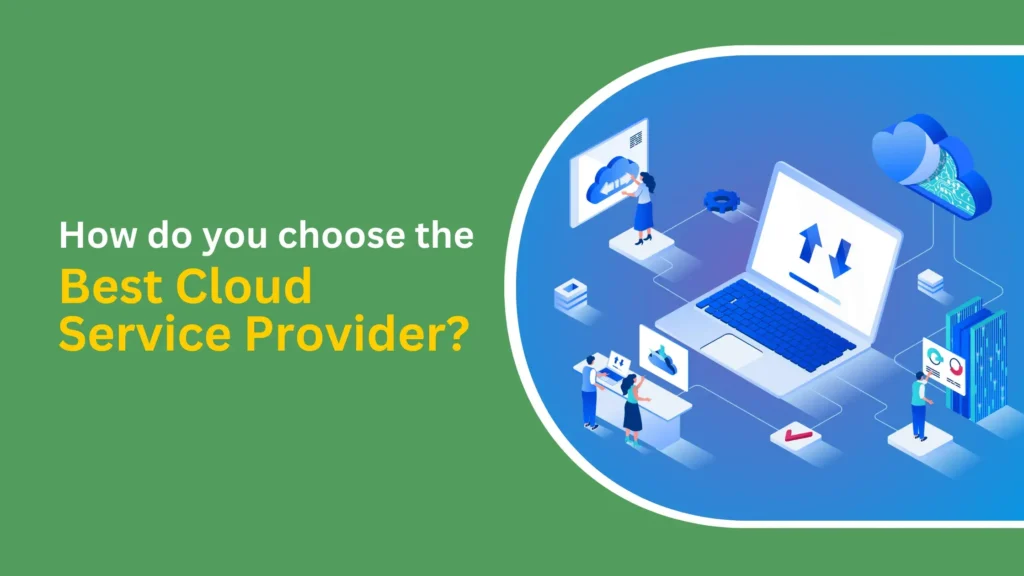Cloud computing is essential for businesses and individuals today. Choosing the right cloud service provider (CSP) is important for your operations. It helps you work efficiently, grow your business, and keep your data safe. This helps you evaluate and choose a Cloud Service Provider (CSP) that fits your needs, whether for personal projects or large business uses.
Understanding Your Requirements:
Type of Cloud Services Needed: Infrastructure as a Service (IaaS): This model provides virtualized computing resources over the Internet, including servers, storage, and networking. Evaluate if you require granular control over your infrastructure. Consider your need for flexibility in configuring and managing these resources.
Platform as a Service (PaaS): lets you develop, run, and manage applications without worrying about the infrastructure behind them. Decide if you want to focus on quickly developing and deploying your applications.
Software as a Service (SaaS): It is a way to deliver software over the internet. With SaaS, users can access applications hosted in the cloud without needing to install them on their computers. This makes it easier to use software and allows for flexible scaling, as users can adjust their usage according to their needs.
Scalability: Evaluate the provider’s ability to scale resources based on demand automatically. Look for features like auto-scaling and elasticity.
Consider your projected growth and ensure the provider can accommodate future scaling needs.
Compliance and Security: Identify industry-specific compliance requirements (e.g., HIPAA for healthcare, PCI-DSS for finance).
Check how sensitive your data is to decide what security measures you need. This may include using encryption, setting access controls, and choosing where to store your data. Also, understand your provider’s shared responsibility model.
Researching Cloud Providers:
Reputation and Reliability:
- Look into the provider’s history, financial health, and presence in the market.
- Pick providers that have a strong record of high uptime and few service outages.
- Check how available and responsive the customer support channels are, like phone, email, and chat.
- Assess the provider’s knowledge base, documentation, and community forums.
- Consider the provider’s service level agreements regarding support.
- Get feedback from industry analysts, independent reviewers, and current customers. Find case studies and testimonials that show the provider’s strengths and weaknesses.
Evaluating Technical Capabilities and Performance :
- Data Centers: When choosing a provider, think about where their data centers are located and how close they are to your users. Check the security measures they have in place and how they ensure redundancy.
- Performance Metrics: Look at important performance measures like latency, throughput, and network speed. Choose providers that promise high performance and have clear service level agreements.
Disaster Recovery:
- Review the provider’s plans for recovering from disasters and ensuring business continuity.
- Evaluate the provider’s data backup and replication strategies.
- Understand the provider’s RTO and RPO.
Considering Security and Compliance :
- Security Measures: Evaluate the provider’s encryption methods, access controls, and threat detection capabilities.
- Assess the provider’s security certifications and compliance with industry standards.
- Compliance Standards: Ensure the provider complies with relevant data protection regulations and industry standards.
- Verify that the provider undergoes regular security audits and assessments.
Understanding the Costs :
- Pricing Structure: Examine the provider’s pricing models, including pay-as-you-go, reserved, and spot instances.
- Consider the costs of data transfer, storage, and other services.
- Total Cost of Ownership (TCO): Look at the long-term costs of using the provider’s services. This includes expenses for maintenance, support, and upgrades.
- Use cost calculators and TCO analysis tools to estimate your expenses.
Reviewing the Service Level Agreement (SLA) :
- Availability Guarantees: Check for uptime guarantees and how the provider measures and enforces them.
- Track Record: Look at the provider’s history of meeting their uptime promises.
- Remedies: Find out what compensation you can get if the service does not meet the agreed standards.
- Escalation Procedures: Learn how the provider handles issues during service disruptions.
Planning for the Migration:
- Ease of Migration: Evaluate the provider’s migration tools and services.
- Assess the complexity of migrating your existing workloads and data.
- Integration with Existing Tools: Ensure compatibility with your current software, applications, and tools.
- Look for providers that offer APIs and integrations with third-party services.
Testing and Deployment
Conduct a Pilot Test:
- Run a pilot test in a non-production environment to check the provider’s services.
- Look at performance, scalability, and reliability in a real environment.
Support During Testing:
- Check how well the provider supports you during testing and deployment.
- Make sure you can access technical experts and helpful resources.
Ongoing Management and Support:
- Monitoring Tools: Check if the provider has complete monitoring tools and dashboards.
- Proactive Monitoring: Look into how well the provider can monitor your system and send alerts before issues arise.
- Account Management: Find out if you will have a dedicated account manager or support team.
- Communication and Responsiveness: Assess how well the provider communicates and responds to your needs.
Making the Final Decision:
- Pros and Cons: Compare the shortlisted providers by listing their strengths and weaknesses.
- Long-Term Effects: Think about how your choice will affect you in the future.
- Partnership Potential: Evaluate if the provider can adjust to your changing needs and help your business grow.
- Look for providers that invest in innovation and offer a roadmap for future development.
Conclusion:
Choosing the right cloud service provider is a key decision. You need to carefully consider what you need and what the provider can offer. By following this detailed guide, you can make an informed choice that will drive your organization’s success and enable technological growth.
Visit our website, www.everitesolutions.com, to learn more about our custom software consulting services. Contact us at email id info@everitesolutions.com and our mobile number +1 404-835-1605 to schedule a consultation and discover how Everite can help shape your business’s future.


